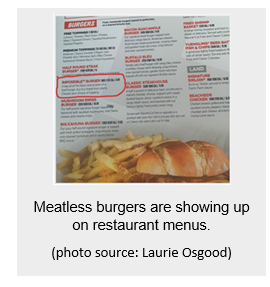
by Laurie Osgood | Oct 11, 2019
Meatless Burger Alternatives

If you have been watching television lately, you may have seen commercials for meatless burgers that are making a splash. Many restaurants including Burger King and Red Robin are now offering this alternative meat source on their menus. https://www.bk.com/menu-item/impossible-whopper, https://www.redrobin.com/burgers/impossible-burger.html,
Beyond Beef™ and Impossible Burgers™ are two of the meat alternatives created by The Beyond Meat ™ https://www.beyondmeat.com/products/ and The Impossible Foods https://impossiblefoods.com/ companies. The Beyond Burger™ and Impossible Burger™ are similar in ingredients, color and texture, and they actually taste like…meat!
According to Emily Gelsomin, in the August 19th edition of Harvard Health Publishing, “Plant-based burgers are not a novel concept. But new products designed to taste like meat are now being marketed to vegetarians and meat-eaters alike”. Gelsomin suggests that meatless burgers are a good source of protein, vitamins, and minerals.
But What Are They?
Keep in mind that meatless burgers are created in a lab, not in a pasture. Meatless burgers look, sizzle, and even “bleed” like a regular hamburger. But they contain no animal protein and are a completely plant-based patty. This plant-based protein is a blend of potato and soy proteins. Meatless burger alternatives get their red color and “bleeding” effect from beet juice. Meatless burgers sizzle while being cooked because of sunflower and coconut oils, the meatless burger’s fat sources. To hold everything together, meatless burgers contain methylcellulose, a bulk-forming fiber source.
Are Meatless Burgers Safe?
Yes, meatless burgers are safe to eat, unless you are allergic to soy, coconut or sunflower.
The Good News:
Meatless burgers contain less sodium, cholesterol and fat than traditional beef or ground turkey patties do. Meatless burgers contain 2-3 grams of fiber per serving, whereas traditional hamburger patties contain no fiber.
The Bad News:
Just because they are a plant-based alternative to meat, doesn’t mean that they are healthier for you. The calories found in a meatless burger are similar to a traditional beef patty and meatless burgers are heavily processed and high in saturated fat.
How Do These Meatless Burger Alternatives Compare Nutritionally to Ground Beef and Ground Turkey Patties?

Source: Harvard Health Blog. Impossible and Beyond: How healthy are these meatless burgers? August 15, 2019.
The Bottom Line:
Meatless burgers such as The Impossible Burger™ and Beyond Burger™ are unique alternatives, although nutritionally not that different from a traditional hamburger patty. However, due to its popularity, companies such as Impossible Foods and Beyond Meat have struggled to keep up with the demand.
Contact your local Family & Consumer Sciences Extension Agent to learn more about meatless alternatives.
Sources
https://www.health.harvard.edu/blog/impossible-and-beyond-how-healthy-are-these-meatless-burgers-2019081517448
Shopping for Health, Vegetarian Diets https://edis.ifas.ufl.edu/pdffiles/FS/FS16700.pdf

by Laurie Osgood | Jun 7, 2019
 What is Stress Anyway?
What is Stress Anyway?
The traffic is awful, a report is due, the laundry is piling up, and the kids are fighting. Life is full of stress! According to the National Institute of Mental Health, stress is how the brain and body respond to any physical, mental, and/or emotional demand. Not all stress is bad. For example, stress can help motivate us to get things done. When faced with a threat or stressful event, our bodies produce hormones such as epinephrine, which can cause a temporary rise in our heart rate and blood pressure. Chronic, un-managed stress can cause long-term symptoms including headaches, high blood pressure and even problems sleeping.
Identify the Sources of Stress in Your Life
Feeling stressed is normal, but some people cope with stress better than others. Our thoughts, lifestyle and emotions can affect how much stress we endure. We must identify the causes of our stress before we can begin to manage them. Although the causes of stress are similar for both men and women, it is how we recognize and manage our stress that makes us different.
Common Causes of Stress:
• Work or unemployment
• Money, finances
• Drug or alcohol abuse
• Family breakdown
• Health issues
• Major life changes
What are the Symptoms of Stress?
Our bodies automatically respond to stressors in our lives. However, constant and uncontrolled stress can lead to serious physical and mental consequences. No matter how stressful your life seems, we must recognize the warning signs of stress and take action.
Watch out for the following warning signs:
• Feeling tired, not sleeping properly
• Loss of concentration and an inability to complete projects
• Irritability, low self-esteem or mood swings
• Feeling tense or anxious
• Feeling unmotivated
• Withdrawing from family and friends
• Excessive drinking and/or drug use
• Physical signs such as headaches, chest pains, high blood pressure, digestive problems or aches and pains
Men and Woman Handle Stress Differently
How stress affects you may depend upon your gender. Men and women recognize and react to stress in different ways, both mentally and physically.
When feeling stressed, women reach out to friends and family. They seek support to lower their stress and find a solution to their challenges. By talking about their emotions, women are able to process their feelings and share the pressure of their situation.
When men experience stressful situations, they are likely to hide their feelings or change the subject to escape a stressful situation. Men find it hard to talk about their feelings or ask for help when faced with pressures from their job, family issues or money worries. Men prefer to play sports or listen to music to manage stress.
Stress Reduction Strategies for Men and Women
Stress is a normal part of life, but chronic stress can be bad for our health. Stress management means taking control of your thoughts, emotions, and lifestyle. Making simple changes in your life such as maintaining a network of close friends, exercising, eating a healthy diet, and getting enough sleep can help reduce your overall stress.
Resources:
The American Psychological Association: https://www.apa.org/news/press/releases/stress/2010/gender-stress
The National Institute of Mental Health: https://www.nimh.nih.gov/health/publications/stress/index.shtml
The Electronic Data Information Source of UF/IFAS Extension. EDIS: https://edis.ifas.ufl.edu/pdffiles/FY/FY51700.pdf
To learn more about how to cope with stress, contact Laurie Osgood, Family and Consumer Sciences Agent at the UF/IFAS Extension Office in Gadsden County (850) 875-7255 or Osgoodlb@ufl.edu


by Laurie Osgood | Feb 6, 2019

Regular vehicle maintenance can help you avoid expensive repairs. Photo credit: UF/IFAS Northwest District
A car is one of the biggest investments we will make. With proper car maintenance, you can increase safety, improve performance, and save money in the long run. According to AAA, big improvements in powertrain technology, lubricant, and rust prevention have led to improvements in automobile reliability, longevity, and durability. With proper care, almost any car can make it well past the 100,000-mile mark.
TIPS FOR PROLONGING THE LIFE OF YOUR CAR
• Do some research and purchase a safe, reliable vehicle
• Stick to the recommended car maintenance schedule
• Buy high quality parts: engine oil, battery, tires, etc.
• Keep your car clean, inside and out
• Know what to look for if your car is beginning to show signs of trouble
WARNING SIGNS THAT YOUR CAR MAY BE HEADED FOR TROUBLE
You know your car, and, therefore, you are the best judge of when it’s acting differently. There are signs your car may exhibit that will warn you of a potential problem. It could be a light, a sound, or an unusual smell. Consumer Reports recommends at the first sign of trouble, you should take your car to a reliable mechanic.
WARNING LIGHTS
Lights that appear on your dashboard are connected to sensors that monitor everything your car does. If your car senses that something isn’t quite right, the computer will use these lights to tell you what it is. If any of these lights appear, your mechanic will be able to hook up your vehicle to a diagnostic scan tool to identify the trouble and find out exactly what’s prompting the light to turn on.
Pay attention to these warning lights, as they could indicate a problem with your vehicle:
• Check Engine
• Check Oil/Oil Level Low
• Oil Pressure Low
UNUSUAL SOUNDS
You know your car and the sounds it normally makes, but new or different sounds can be a sign of trouble. These sounds can be a clue to what’s going on under the hood. GEICO Insurance offers a list of these sounds and their possible causes.
Sounds and Possible Causes
- A sound like a coin rattling inside a tin can: Could be a loose lug nut inside the hub cap.
- Brakes squealing or grinding: Your brake pads or shoes might need to be replaced. Pads may be worn, and the sound is metal on metal.
- A snapping, popping, or clicking sound when you turn a corner: One or both of the constant velocity (CV) joints on your front axle could need to be replaced.
- A rhythmic squeak that speeds up as you accelerate: This could indicate a problem with the universal joints (U-joints) in the driveshaft.
- A howling, whining, or even “singing” sound: Bearings, which are small metal balls that help parts rotate smoothly, may not be properly working.
- A rhythmic clunking, tapping, or banging from under the hood: This could indicate a problem with valves, pistons, or connecting rods. Rough, bumpy motions could be caused by faulty spark plugs, clogged fuel lines, or a bad fuel filter.
- A squealing sound from under the hood at start-up or when accelerating: This sound could be caused by worn or loose accessory belts for the power steering pump, air conditioner compressor, alternator, or the serpentine belt.
FOUL SMELLS
Toxic gases such as carbon monoxide are contained in a car’s exhaust system. If you smell a foul or strong smell while inside your car, this may be a sign of a serious problem. You should have it checked by a mechanic as soon as possible. If oil or coolant is leaking, this may mean hazardous exhaust gases are entering the interior of your car.
The smell of rubber burning could be a signal that your car’s drive belts or accessory belts underneath the hood are damaged, worn, or loose. These belts will need to be replaced as soon as possible to prevent more problems.
SMOKE
Smoke can come from the front or back of your car. Smoke coming from beneath the car’s hood most likely means your engine is overheating, and you should bring it to a mechanic right away. The color of the smoke coming out of your exhaust pipe can give you a clue about what may be going on inside your engine.
Blue Smoke: This could mean oil is escaping from somewhere within the engine and is being burned along with the gasoline. If you see blue smoke, your mechanic should look for damaged or worn seals in the engine.
White Smoke: May mean antifreeze or water condensation may have mixed in with the gasoline. You should have it checked out as soon as possible.
Mechanics agree that preventive maintenance, including regular oil changes and belt replacement, can help to extend the life of your car. Car maintenance can be an inconvenience that requires time, planning, and effort. But, in the long run, the benefits of driving a safe car outweigh the cost and aggravation.
For more information on how to save money by properly maintaining your car, contact your local UF/IFAS Extension Office.
Sources:
AAA: https://magazine.northeast.aaa.com/daily/life/cars-trucks/benefits-maintaining-vehicle/
Consumer Reports: https://www.consumerreports.org/car-repair-maintenance/make-your-car-last-200-000-miles/
GEICO: https://www.geico.com/more/driving/auto/auto-care/car-noises/?utm_source=geico&utm_medium=email&utm_content=newsletter&utm_campaign=feb2018

by Laurie Osgood | Jan 17, 2019
January 24th is Global Belly Laugh Day!

Make health and wellness a part of your calendar and daily routine.
Photo source: UF/IFAS Northwest District
Each year, we celebrate many holidays, but there are also many observances and commemorations scheduled throughout the calendar year. Some are odd, like National Science Fiction Day, Word Nerd Day, and even National Dinosaur Day. Others serve as a good opportunity to raise awareness about important health topics and remind us to take control of our health.
Celebrating the new year means leaving the past behind, making positive changes, and the continuation of success and happiness. National observances such as Breast Cancer Awareness Month, National Family Health History Day, and World AIDS Day help us come together to spread awareness and show support for each other.
Organizations such as the American Heart Association, American Cancer Society, and American Lung Association have created nationwide awareness month campaigns to draw attention to some of the leading causes of death in America. Other observances, such as Take a Loved One to the Doctor Month from the Florida Department of Health, encourage people to take charge of their own health and to urge their loved ones to do the same.
So, as you are looking forward to the new year, make health and wellness a part of your calendar and daily routine.
UF/IFAS Extension wishes you and your family a year fully loaded with happiness, prosperity, and health.
To learn more about health observances and how to encourage your loved ones to take control of their health, contact Laurie Osgood, Family and Consumer Sciences Agent at the UF/IFAS Extension Office in Gadsden County, (850) 875-7255, or osgoodlb@ufl.edu

by Laurie Osgood | Dec 1, 2018
It’s the Most Wonderful Time of the Year… for Criminals, Thieves and Scammers

Photo source: UF/IFAS Northwest District
This holiday season scammers and identity thieves are hoping to take advantage of shoppers who may be too preoccupied with travel, gift-buying, and festivities to notice. Therefore, during the holidays, it is even more important to remain vigilant while shopping in stores or online.
More people are turning to online shopping for their holiday gifts. The National Retail Federation forecasts consumers to spend about $721 billion this holiday season. However, this increase in online spending comes with a greater risk for thieves to steal your money or your identity.
Here are some common holiday scams and how to protect yourself from becoming a victim:
Deals That Are Too Good to Be True –while shopping online keep the old adage in mind, “If it sounds too good to be true, it probably is”. During the holidays, shoppers are looking for huge deals, and scammers know it. These thieves often set up websites that appear to be legitimate, just to steal your personal information and/or to download a virus onto your computer.
It is important to make sure any site in which you shop contains an HTTPS security designation. Another simple way to know if the website is authentic is to look for the padlock symbol that appears in the address bar of the retailer. Here is an example of an Amazon online address bar.

Holiday Phishing Scams – Around the holidays, beware of emails pretending to be sent from familiar companies like FedEx or UPS. These emails claim to provide links for package tracking information. These links, once clicked on, will either steal your personal information or download a virus onto your computer. Remember, if you receive an email from someone you don’t know or weren’t expecting an email from, you should never click on links. Also, make sure you are using current antivirus software on your computer.
Identity Theft and ATM Skimmers –
In Store Shopping:
-
- Being vigilant is key to protecting yourself during the holiday season. Thieves target shoppers who are either struggling with packages and bags or those who are unaware of their surroundings. Thieves see this as an opportunity to steal your wallet or credit card numbers.
- When using an ATM or other key pads, make sure to check for skimming devices that thieves install on ATMs and other card readers. These skimmers are placed over the existing key pad in order to access your account. It is also advised to cover the keypad when entering your pin number while purchasing items or getting money from an ATM
- After each purchase, take time to put your credit card back into your wallet. Also, it may be worthwhile to purchase an RFID-blocking wallet. These wallets are designed to shield your credit card information from RFID readers and skimmers..
Online Shopping:
- When shopping online, experts advise consumers to use credit cards instead of debit cards. In case of fraud, both payments types can be disputed, however debit card payments are automatically deducted from your bank account. Therefore, it may take longer to get your money back.
Gift Cards– Gift cards are a great idea for people on our shopping list. However, a record number of retail stores are closing their doors, so you should consider the retailer’s financial situation before buying a gift card. If the retailer closes or declares bankruptcy, the recipient may not be able to use the gift card.
Package Delivery Theft- Having packages delivered to our homes makes us a target for thieves who case neighborhoods and even follow delivery trucks looking for packages sitting on porches. There are ways to prevent this from happening to you. You can have your packages delivered to their office, a local pick-up area, like a UPS Store or try to schedule delivery times when someone will be home, if possible. Online shoppers can also set up tracking notifications, to know when an item is delivered.
Charitable Giving Tips – Give to charities wisely. At this time of year, we all want to give to charities that pull on our heart strings. But beware of giving money to charities that are fake or irresponsible. Do your research to make sure to support the many legitimate and deserving charities that can use our help during the holidays.
The 2018 Consumer Protection Guide – This guide provides more information about protecting yourself as a consumer, including online identity theft, charity scams, item recalls and more.
The holiday season brings out the best and worst in people. Therefore, you should be vigilant because the holidays are a lucrative time of year for thieves and scammers who are trying their hardest to get into your bank account.
For more tips on how to keep your identity safe and avoid holiday scams, contact Laurie Osgood, UF/IFAS Extension, Gadsden County at Osgoodlb@ufl.edu or call (850) 875-7255.













